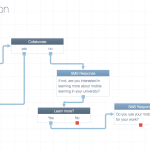I was writing a bit in a previous post about possible SMS applications specifically geared towards formalized learning (like at the university level), how they might be structured, and what range of learning activities they might encompass. It seems like I wasn’t the only one with this thought in mind. That is encouraging. SMS still has dramatic impact in many parts of the world and this includes developed nations as well. The type of outreach that one can perform via SMS for at-risk students, for study groups, for collaboration and discussion is dynamic. It has great impact. It is accessible and relatively low-cost. It doesn’t require an application or a specific platform.
I, frankly, would like to see more of it used in the United States or in the UK or anywhere where we are, perhaps, a bit too enamored of the gloss of technology at the expense of alignment. We need to align the learning task to the learning tool and SMS is perfect for discussion and text-based communication. It is perfect for scheduling and assessment and outreach. It is deeply personal. A text cuts through a lot of the noise in mobile communications. So it is encouraging to see some organizations either doubling down on the technology (Nokia) or building entire models around it (TextIt).
Nokia and Kenyan Schools
I noticed this article the other day via UNESCO and retweeted it:
RT @UNESCOICTs: Nokia pilots mobile-based education platform in Kenya http://t.co/WYgsC4uhy2 #m4d #mlearning
— Michael Gallagher (@mseangallagher) July 23, 2013
This is a good example of the resources that large organizations can marshall towards large-scale projects like this. In short, Nokia has organized a platform that carries educational material to mobile phones which can then be connected to a television or projector to teach larger groups of learners. More of a content delivery system than an actual learning one (there is a difference), but a positive pilot. The mobile network Airtel has offered to provide free data bundles for downloading the content. Nokia provides the hardware (and partners with other organizations for the content) and Airtel provides the data costs. It is being piloted in 10 Kenyan schools and I wish them all the luck with the project.
My only trepidation is the general downside of having these projects organized and administered by large corporations. Invariably, their priorities shift, their patience with progress runs thin, or the PR focus of the pilot project reveals itself as the true driver. I am not saying this is the case here as Nokia actually has a good track record with this kind of activity, but it is something to be aware of.
TextIt: SMS workflows made easy
Another organization that is relying on SMS as the foundation of its entire model is TextIt, a Kigali, Rwanda-based startup that is offering a platform for organizations, schools, groups, anyone really, to build relatively complex models of activity specifically through SMS. I have been graciously invited to beta test and provide feedback and I must say I am impressed. This is more or less everything I wanted to do with SMS for developing learning environments. I now desperately want a project to work on to test it out.
The real design advantage of TextIt, I think, is the drag and drop Flow (charts) that create intricate series of If/Then logic statements for the SMS communication. This is an accessible design for the non-technical among us as these flows could easily be designed by teachers or administrators. The flows are as logical as curricula or a lesson plan.
There is also the prerequisite contact management functionality, the message/communication dashboard (of all messages coming in and out), and phone settings. There are monthly subscription costs involved in some of the more premium models, but if the costs were distributed across the organizations or school districts, then presumably these would be minimal.
It was almost odd as I was writing about this just the other day, how SMS can be used for school-wide systems and here comes TextIt. So I could easily transform the model (or flow) I had proposed then:
Quite a good step forward, especially for managing learning communities. I will keep beta testing as long as I am allowed, all the while searching for an educational project to apply this to.






Great stuff. Really enjoyed the read.
Thanks, Craig! Glad you found it useful.